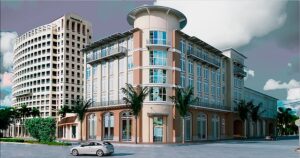
Commercial Real Estate Loan
What is a Commercial Real Estate Loan?
A commercial real estate loan is used to purchase or refinance non-residential properties such as office buildings, retail stores, warehouses, multifamily apartments (5+ units), hotels, and more.
If the property is being used for your own business operations, an SBA loan may be a better fit. In such cases, we recommend exploring SBA loan options tailored for owner-occupied properties.
We don’t offer just one loan program. Instead, we compare a wide range of loan options from banks, credit unions, and private lenders to provide each client with the most favorable terms available. You can receive a free loan pre-qualification with no obligation, and we will guide you step by step through the entire process with transparency and care.
Overview of Investment-Purpose Commercial Real Estate
What is Investment Commercial Real Estate?
It refers to properties such as office buildings, retail centers, warehouses, multifamily apartments (5+ units), hotels, and more—
purchased not for personal or business use, but rather to generate rental income or profit from property appreciation.
If the property is partially used by the owner, it may not be considered purely investment property.
✅Key Investment Purposes in Commercial Real Estate
1️⃣ Rental Income Generation
The most common reason to invest in commercial real estate is for consistent rental income. Investors lease the property to tenants and generate monthly cash flow, often through long-term leases such as NNN (Triple Net) or Gross leases.
Benefits:
Predictable and stable income stream
Potential to earn more than monthly loan payments (PITIA)
Income can grow with rent increases and inflation
Example:
A strip mall generates rent from multiple tenants who pay base rent plus CAM (common area maintenance) fees.
2️⃣ Capital Appreciation
Commercial real estate values tend to increase over time, allowing investors to benefit from capital gains upon sale. Properties in high-demand areas or those that are repositioned/renovated may appreciate significantly.
Benefits:
Asset value increases over time
Forced appreciation through improvements or tenant upgrades
Potential for large profit upon resale
Example:
An outdated retail center is renovated, leases upgraded, and sold at a much higher valuation after a few years.
3️⃣ Tax Advantages (Depreciation, Cost Segregation, etc.)
U.S. tax law allows investors to claim depreciation deductions on commercial properties. Through strategies like cost segregation, components of the building (e.g., HVAC, flooring) can be depreciated faster, reducing taxable income significantly—especially in the early years.
Benefits:
Lower taxable income even while earning positive cash flow
Significant tax savings for high-income individuals
Ability to offset other income with paper “losses”
Disclosure: Please consult with a licensed tax professional or attorney for personalized advice.
4️⃣ Portfolio Diversification
Commercial real estate acts as an alternative asset class, helping investors diversify their portfolios beyond stocks and bonds. It often behaves differently than public markets and can offer protection during economic volatility.
Benefits:
Low correlation with stock market
Adds balance and stability to investment portfolio
Combines income (cash flow) and growth (appreciation)
Example:
An investor with a stock-heavy portfolio adds multifamily or retail real estate to reduce overall portfolio risk.
5️⃣ 1031 Exchange (Tax Deferral Strategy)
Under IRC Section 1031, investors can defer capital gains taxes by selling an investment property and reinvesting the proceeds into another like-kind investment property. It’s a powerful tool for building long-term wealth.
Key Conditions:
-
Both the sold and replacement properties must be for investment or business use
-
Must identify replacement property within 45 days and close within 180 days
-
Must use a Qualified Intermediary to facilitate the exchange
Benefits:
-
Defer capital gains tax payments
-
Reinvest full equity into larger or better-performing properties
-
Preserve and grow wealth tax-efficiently
Example:
An investor sells a rental property and uses a 1031 exchange to purchase a larger retail center without paying capital gains taxes at the time of sale.
Disclosure: Please consult with a licensed tax professional or attorney for personalized advice.
 Typical Loan Terms (General)
Typical Loan Terms (General)
| Item | General Term |
|---|---|
| Loan to Value (LTV) | 70 – 75% max, (25% – 35% down payment) |
| Interest Rate | Varies by lender and market |
| Loan Term | 5-year fixed / 25-year amortization, or 10/30 structure |
| DSCR Requirement | 1.20+ preferred |
| Documentation | Rent roll, P&L, investor’s financials |
| Title | Purchase under LLC or Corp allowed |
 Common Types of Investment Commercial Properties:
Common Types of Investment Commercial Properties:
Retail (e.g., strip malls, shopping centers)
Multiple tenants possible
Highly sensitive to location and foot traffic
Office Buildings
Longer leases but affected by remote work trends
Multifamily (5+ units)
Steady income, potential for Section 8 tenants
Industrial / Warehouse
Fewer tenants, longer lease terms, logistics demand growing
Mixed-Use
Combination of retail and residential units
Special-Purpose (e.g., gas stations, hotels)
High ROI potential but riskier and needs specialized financing
📌 Key Investment Considerations
Location is critical — impacts rent, vacancy, and appreciation.
Tenant quality and lease terms — Triple Net (NNN) leases are preferred.
Exit strategy — refinance or sell; plan ahead.
Operational experience — helps with financing and management.
🧾 Recommended Loan Types
DSCR Loan: Based on rental income, no tax return or W2 required
Bridge Loan: Short-term, fast-close for renovation or repositioning
Hard Money Loan: Asset-based lending, fast approval, higher rates
Bank/Credit Union CRE Loans: Full-doc, lower rates, stricter underwriting
Private Lender Loans: Flexible structure, asset-driven terms
